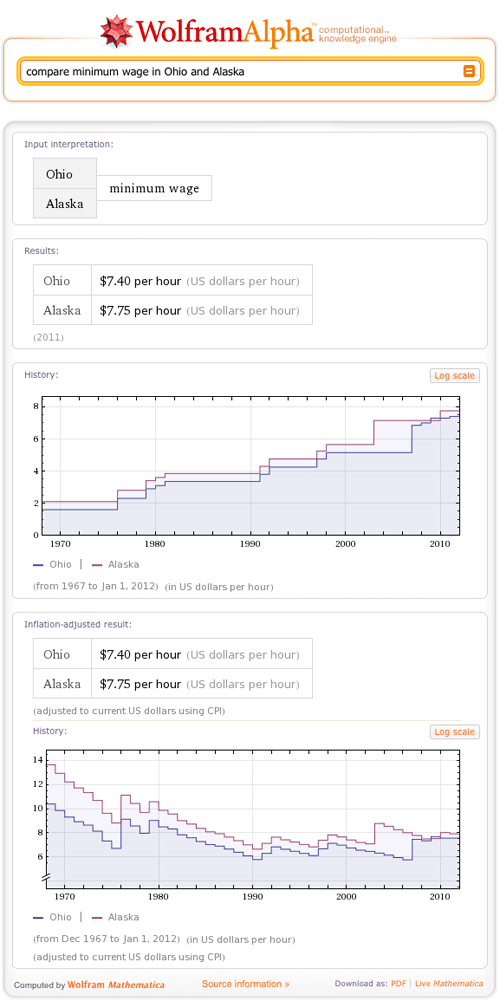 8
8
Are you looking to make a move in the near future? Budgeting for your next vacation? Before you go anywhere, check out Wolfram|Alpha’s data on costs of living and consumer goods. Whether you’re simply looking to get the most bang for your buck, or figuring out how your salary needs to change to maintain your lifestyle in a new city, look no further for some quick answers. More »
 23
23
Over the last several months, one of the most-requested features for Wolfram|Alpha has been to add information about the cryptocurrency Bitcoin. Well, you asked, and we’ve answered: Bitcoin data is here! More »
 4
4
Wolfram|Alpha has released a suite of apps that cover all of your financial needs. The apps are profoundly powerful tools, allowing you to stay informed about your business’s finances and the marketplace at large while in the office or on the go. More »
 1
1
Most of the new features we announce on this blog are large-scale projects where we add a huge chunk of data to Wolfram|Alpha all at once. But there are always dozens of background projects going on at any given time—including a seemingly never-ending effort to expand our database of information on private companies.
August 8 is “National Dollar Day,” commemorating the establishment of the US monetary system on this day in 1786. But the first dollar bill wasn’t issued until 1862—and instead of George Washington, it featured a portrait of Salmon P. Chase, then Secretary of the Treasury under President Lincoln (and later Chief Justice of the Supreme Court). More »
 3
3
Recently, CNNMoney published stories highlighting the “20 most profitable companies” and those considered to be the “20 biggest money losers”. Companies such as Exxon Mobil, AT&T, Apple, and Verizon were ranked by their 2010 profits, with each of the 20 profitable companies bringing in well over a billion dollars.
Using the information provided by both articles, there are many opportunities to gain more data on each of the companies from Wolfram|Alpha. For example, Exxon Mobil topped the list of most profitable companies, but has it always been profitable? Entering “Exxon earnings” into Wolfram|Alpha produces data and graphs documenting its earnings history.
 4
4
Wolfram|Alpha recently added information about the minimum wage in U.S. states (from 1967 through today) based on data from the U.S. Department of Labor. This means you can ask Wolfram|Alpha about simple historical facts, like the U.S. minimum wage in 1980, or perform simple analyses, like comparing the current minimum wage in Ohio and Alaska.
 1
1
On August 2, The New York Times reported that the (near) final estimate for the total amount of oil leaked into the Gulf of Mexico as a result of British Petroleum’s (BP) Deepwater Horizon drilling accident is approximately 4.9 million barrels. It would be nice to understand what this number means in the context of the commodity markets where oil is traded. It would also be nice to better understand what this oil spill did to BP stockholders.
Wolfram|Alpha can help answer these questions. For example, someone might wonder what all this oil would be worth on the oil market. The input “price of 4.9 million barrels of oil” tells us that the value of this oil on the oil futures market is around $398.8 million (at the time this was written). That’s a lot of money just floating around the Gulf! But to be fair, much of it was cleaned up. Wolfram|Alpha also shows a graph of how the value of this oil has fluctuated over time as well as the latest quote of a barrel of oil on the New York Mercantile Exchange.
Someone might wonder whether the amount of spilled oil was enough to affect the price of oil in the U.S. The input “oil futures open interest” gives us the number of oil futures contracts currently in existence for the front-month contract. 
As the graph illustrates, open interest starts out strong every month (as the front-month contract rolls forward to the next month). As the contract approaches expiration, some people close out their positions while others roll their positions forward into a future month’s contract. The best measure of open interest would be the higher numbers shown immediately after the front-month rolls forward (especially since other contract months aren’t accounted for here).
More »
 3
3
Wolfram|Alpha launched with an extensive database of United States economic data, derived from the Federal Reserve Bank’s FRED database. Over the past year, we’ve continued to improve our handling of this data in a variety of ways—teaching Wolfram|Alpha to return more related statistics along with any specific result, improving our linguistic abilities so we can answer more complex questions, and increasing the frequency with which we update this data. Wolfram|Alpha is now refreshing its collection of FRED-derived data on a daily basis, so you can always access the latest available data on the national economy.
We’ve also begun to expand our coverage of economic data for smaller geographic areas in the United States, starting with state-level statistics. This means Wolfram|Alpha users can now query for the latest available information on a variety of economic topics, including gross state product, unemployment, health insurance coverage, and housing-related data.
As always, one of the strengths of Wolfram|Alpha is that it allows you to compare and analyze different pieces of data—and with this data set, you can quickly uncover strong correlations between various economic properties. It’s easy to see that the house price index tends to move together with employment and state tax collections. You can also use Wolfram|Alpha to run simple calculations of productivity in U.S. states, or to find out a given state’s share of the national economy or workforce.
To make it even easier to explore this data, you can also use the new Wolfram|Alpha Widget Builder to create simple tools for analyzing and comparing the economic properties of states. To get you started, here’s a small selection of widgets focused on US state economies—ranging from the serious to the slightly silly. Try them out:
Feel free to customize and share these on Twitter or Facebook, in your blog, or anywhere else—and let us know in the comments if you create any useful new widgets of your own.
 6
6
Hello, fellow readers of the Wolfram|Alpha Blog—my name’s Justin. In just a few short weeks, I’ll be graduating from the University of Illinois at Urbana-Champaign. Over the years I’ve found my own way of getting things done in regards to homework and studying routines. But this semester I realized there were tools available that would make studying and completing assignments easier and help me understand better. One tool that has become increasingly valuable in my routine and those of other students on my campus is Wolfram|Alpha. Recently, I was invited to share how Wolfram|Alpha is being used by students like myself.
Being a marketing major, I had to take some finance and accounting courses, but I was a bit rusty with the required formulas and the overall understanding of the cash flow concepts, such as future cash flows and the net present values of a future investment. A friend recommended I check out Wolfram|Alpha’s finance tools, and they’ve became indispensable in my group’s casework for the semester. Each proposed future investment we were met with, we would go directly to Wolfram|Alpha to compute the cash flows. We even went as far to show screenshots, such as the one below, of inputs and outputs in our final case presentation last week.
I’ve met other students on my campus who have found Wolfram|Alpha to be helpful in their courses. A few months ago while studying in the library, I walked by a table of freshman students all using Wolfram|Alpha on their laptops. I decided to stop and chat with them because I knew one of the girls. They explained how they were using Wolfram|Alpha to model functions and check portions of their math homework. All three girls are enrolled in Calculus III, and not exactly overjoyed about the fact of future— and most likely harder—math classes. More »
 17
17
For active investors, the fast-paced nature of the trading floor requires having tools available to make confident decisions in a timely manner. Wolfram|Alpha offers a collection of money and finance tools ideal for finance professionals and personal finance matters. This data flows into Wolfram|Alpha in real time, providing traders with computation results in charts and graphs. In this post, we’ll look at a variety of ways Wolfram|Alpha can compute and present stock data.
Let’s start with the basics. Simply enter the name of a stock, such as Starbucks or its ticker symbol SBUX, into the computation bar. Wolfram|Alpha retrieves and analyzes both real-time and historical data, and presents the output in category pods. The pods display information such as the stock’s current value at last trade, its value at open and close, and range for that trading period. The “Fundamentals and financials” pod displays information such as the stock’s market share, revenue, number of employees, dividends, and more. Change the “Fundamentals” option on the right side of the pod to see additional information, including ratios, balance sheets, and income and cash flow statements.
 17
17
We like to demonstrate ways Wolfram|Alpha can be a helpful tool for everyone. Today we’d like to share a cool feature Wolfram|Alpha users are talking about on the web. The Retirement Savior blog posted an item on Wolfram|Alpha describing how it can be used to calculate your retirement investments.
Wolfram|Alpha’s investment-returns calculator prompts you to describe your current investment strategy. Once you submit your query, Wolfram|Alpha will provide you with a number of results such as a linear chart depicting investment value projection scenarios, pie charts of resource allocation, a bar graph that allows you to easily compare the distribution of ages at which the account balance would reach zero, and a table displaying projections of your portfolio’s value at various ages. More »
 12
12
We know college is hard. So we’re highlighting examples of how Wolfram|Alpha can make subjects and concepts a bit easier to learn. Wolfram|Alpha is a free computational knowledge engine that can help you tackle everything from calculus, to computing the number of pages for a double-spaced 1000-word essay, to comparing the flash points of methane, butane, and octane, to figuring just how much money it’s going to cost you to drive home to do your laundry. Check out a quick introduction to Wolfram|Alpha from its creator, Stephen Wolfram.
We want to help you take full advantage of this resource. Over the next term, we’ll be highlighting helpful computations and information here on the blog, and even providing ways you can get involved with our company. (Would you like to be a part of the Wolfram|Alpha Team on your campus? Stay tuned to find out how you can be involved.) For this post we selected several of our favorite examples to help you start thinking about how you can use Wolfram|Alpha in your courses, and in your always-changing college life. More »






